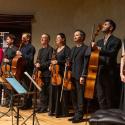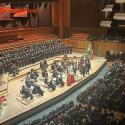So it begins. Thousands of expectant audience members in a sweltering Albert Hall – heave ho! – riotous applause for the leader as he tunes the orchestra. A few more visits and all this will seem normal again, but it’s a culture shock to be thrown straight back in on the first night.
The First Night of the Proms has to tick many boxes, as does the Last Night, and in both cases the result is usually a very long evening. The season’s themes were presented – anniversary celebrations for Nielsen and Sibelius, as well as a focus on Mozart piano concertos – and we were also treated to a new work and a choral spectacular to close. In isolation, the programme would make no sense at all, but it is held together tenuously by the expectations it raises for the concerts ahead.
Nielsen’s Maskarade Overture is a skittish but substantial opener. The music is playful, but the orchestration is complex and the harmonies unpredictable. Sakari Oramo led a confident and energetic account from the BBC Symphony Orchestra. The awkward runs sometimes got the better of the violins, but any minor intonation issues were redeemed by the sheer ebullience of the performance.
The second half was given over to 'Belshazzar’s Feast', in two musical incarnations, from Sibelius and Walton
Gary Carpenter pitched his Dadaville just right for a First Night commission. The title comes from a Max Ernst work at Tate Liverpool, and the music itself is suitably Dada too. A range of styles are brought together into an eclectic and unpredictable mix. The quiet, breezy passages of the opening suggest Debussy, but soon the tempo picks up and the music becomes more rhythmic and percussion-driven. Carpenter explains in the programme that his piece is designed to exploit the large orchestra assembled for Belshazzar’s Feast, although his textures are considerably more straightforward than Walton’s. More often than not, the strings are employed in simple octave or unison stabs, punching out the rhythms beneath similarly forthright melodic statements from the woodwind and brass. Although short, the piece has a piecemeal sectional structure, but is brought together at the end by a riotous jazzy finale, capped by an impressive trombone break from Helen Vollam. On the final chord we even got fireworks, shot off from the gallery above. Bizarre, but fully in the spirit of Carpenter’s score.
Mozart’s 20th Piano Concerto got a muscular reading from Lars Vogt (pictured below, by Neda Navae), often delicate but always definite. He employed very legato articulation to thread together the long melodic lines, a risky strategy in this acoustic, yet somehow he managed to retain the clarity. Oramo and the orchestra followed suit with a big-boned reading, warm harmonies from the strings and expressive solos from the winds. Yet there was as much discipline to this reading as expression. Tempos were often swift, especially in the finale, and rubato was always finely controlled. Vogt performed his own cadenzas, and these too were highly civilised, elegant and always keeping well within Classical conventions.
 The second half was given over to Belshazzar’s Feast, in two musical incarnations, from Sibelius and Walton. The Sibelius, a suite based on incidental music for a play, was a Proms first – surprising given Henry Wood’s obsession with the composer. But this is very slight music, perhaps explaining Wood’s oversight. The four movements are each based on an oriental-sounding melody, given to a soloist – flute, clarinet, in one movement a duet of viola and cello – and accompanied by string textures so subtle as to be lost to the hall’s acoustic. Sibelius ephemera, nothing more.
The second half was given over to Belshazzar’s Feast, in two musical incarnations, from Sibelius and Walton. The Sibelius, a suite based on incidental music for a play, was a Proms first – surprising given Henry Wood’s obsession with the composer. But this is very slight music, perhaps explaining Wood’s oversight. The four movements are each based on an oriental-sounding melody, given to a soloist – flute, clarinet, in one movement a duet of viola and cello – and accompanied by string textures so subtle as to be lost to the hall’s acoustic. Sibelius ephemera, nothing more.
Walton’s Belshazzar is a Proms favourite, and with good reason. This is the sort of music the Albert Hall was built for, and whatever reservations about the programme up to this point, there was no doubting what an ideal choice it was, nor the quality of the performance. Everything came together here. The BBC Symphony Orchestra was on electric form, as were the combined forces of the BBC National Chorus of Wales, the BBC Singers and the BBC Symphony Chorus. The clarity of the choral singing was exceptional, with every word clearly audible. When sung this well, the sheer complexity of Walton’s choral writing comes to the fore, all the nuances of harmony and counterpoint that make this music distinctive. Oramo made great play out of the many fortepianos, including the one on “Isaiah” in the first line, and the effect on each occasion, from these hundreds of singers, was spectacular. Best of all was Christopher Maltman, simply terrifying as he darkly intoned God’s judgements on the proceedings. Few singers can fill this gargantuan hall the way Maltman does, and his every line here was arresting.
A traditional mix, then, of the new and the familiar to open the Proms. Plenty more Nielsen, Sibelius and Mozart in the weeks ahead. Hopefully more performances to match this Walton as well, an early high point in what promises to be an exciting season.














Add comment